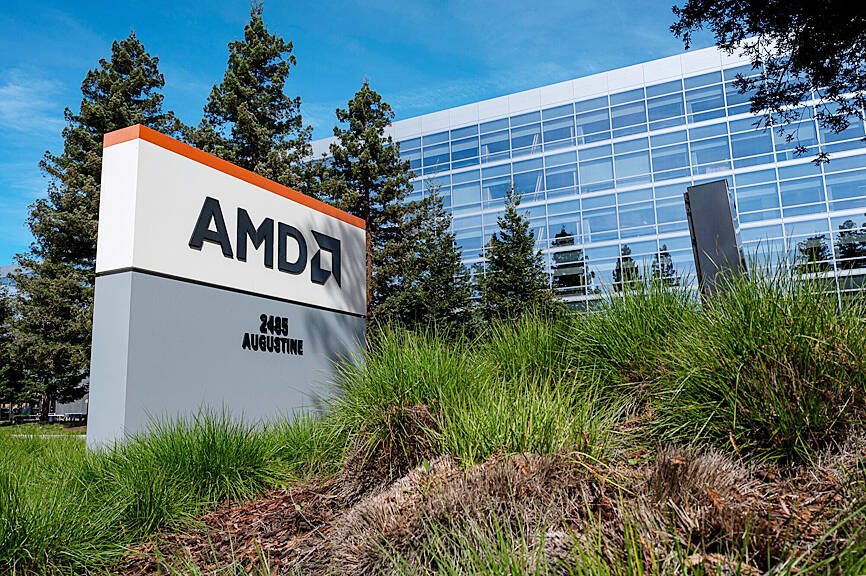Advanced Micro Devices Inc (AMD) has agreed to buy server maker ZT Systems Inc in a cash and stock transaction valued at US$4.9 billion, adding data center technology that would bolster its efforts to challenge Nvidia Corp.
ZT Systems, based in Secaucus, New Jersey, would become part of AMD’s Data Center Solutions Business Group, it said in a statement yesterday.
AMD would retain the business’ design and customer teams and look to sell the manufacturing division. The deal price includes a contingent payment of US$400 million based on certain milestones.

Photo: Bloomberg
AMD shares rose 2.5 percent in premarket trading yesterday after the news.
Closely held ZT has extensive experience making server computers for owners of large data centers — the kind of customers that are pouring billions of dollars into new artificial intelligence (AI) capabilities.
The acquisition would “significantly strengthen our data center AI systems,” AMD chief executive officer Lisa Su (蘇姿丰) said in the statement.
The company has its sights set on Nvidia, the runaway leader in the market for data center gear needed to support AI computing. AMD is adding software and hardware capabilities that would better match the breadth of Nvidia’s offerings and speed up the uptake of its chips.
AMD is the second-biggest provider of the graphics processors that have become so vital to developing AI software. The company has spent more than US$1 billion in the past 12 months to expand its reach in that market.
Last month, the company agreed to buy Silo AI for US$665 million to add a maker of artificial intelligence models.
Santa Clara, California-based AMD is seen as Nvidia’s closest rival in AI processors.
Its new MI range of accelerator chips would bring in more than US$4.5 billion of new revenue this year, the company has projected.
That puts it ahead of all other challengers to Nvidia, but still way behind. Analysts expect Nvidia to generate US$100 billion in data center revenue this fiscal year.
Part of Nvidia’s expansion has been fueled by offering chips, networking, servers, software and services, all aimed at making AI use more pervasive in the economy. Under Su’s leadership, AMD is showing a commitment to match that reach.
AMD shares rose less than 1 percent in New York trading on Friday, leaving the stock little changed this year, but gains over recent years have pushed its market value to US$240 billion, more than twice that of longtime rival Intel Corp.

MULTIFACETED: A task force has analyzed possible scenarios and created responses to assist domestic industries in dealing with US tariffs, the economics minister said The Executive Yuan is tomorrow to announce countermeasures to US President Donald Trump’s planned reciprocal tariffs, although the details of the plan would not be made public until Monday next week, Minister of Economic Affairs J.W. Kuo (郭智輝) said yesterday. The Cabinet established an economic and trade task force in November last year to deal with US trade and tariff related issues, Kuo told reporters outside the legislature in Taipei. The task force has been analyzing and evaluating all kinds of scenarios to identify suitable responses and determine how best to assist domestic industries in managing the effects of Trump’s tariffs, he

TIGHT-LIPPED: UMC said it had no merger plans at the moment, after Nikkei Asia reported that the firm and GlobalFoundries were considering restarting merger talks United Microelectronics Corp (UMC, 聯電), the world’s No. 4 contract chipmaker, yesterday launched a new US$5 billion 12-inch chip factory in Singapore as part of its latest effort to diversify its manufacturing footprint amid growing geopolitical risks. The new factory, adjacent to UMC’s existing Singapore fab in the Pasir Res Wafer Fab Park, is scheduled to enter volume production next year, utilizing mature 22-nanometer and 28-nanometer process technologies, UMC said in a statement. The company plans to invest US$5 billion during the first phase of the new fab, which would have an installed capacity of 30,000 12-inch wafers per month, it said. The

Taiwan’s official purchasing managers’ index (PMI) last month rose 0.2 percentage points to 54.2, in a second consecutive month of expansion, thanks to front-loading demand intended to avoid potential US tariff hikes, the Chung-Hua Institution for Economic Research (CIER, 中華經濟研究院) said yesterday. While short-term demand appeared robust, uncertainties rose due to US President Donald Trump’s unpredictable trade policy, CIER president Lien Hsien-ming (連賢明) told a news conference in Taipei. Taiwan’s economy this year would be characterized by high-level fluctuations and the volatility would be wilder than most expect, Lien said Demand for electronics, particularly semiconductors, continues to benefit from US technology giants’ effort

‘SWASTICAR’: Tesla CEO Elon Musk’s close association with Donald Trump has prompted opponents to brand him a ‘Nazi’ and resulted in a dramatic drop in sales Demonstrators descended on Tesla Inc dealerships across the US, and in Europe and Canada on Saturday to protest company chief Elon Musk, who has amassed extraordinary power as a top adviser to US President Donald Trump. Waving signs with messages such as “Musk is stealing our money” and “Reclaim our country,” the protests largely took place peacefully following fiery episodes of vandalism on Tesla vehicles, dealerships and other facilities in recent weeks that US officials have denounced as terrorism. Hundreds rallied on Saturday outside the Tesla dealership in Manhattan. Some blasted Musk, the world’s richest man, while others demanded the shuttering of his